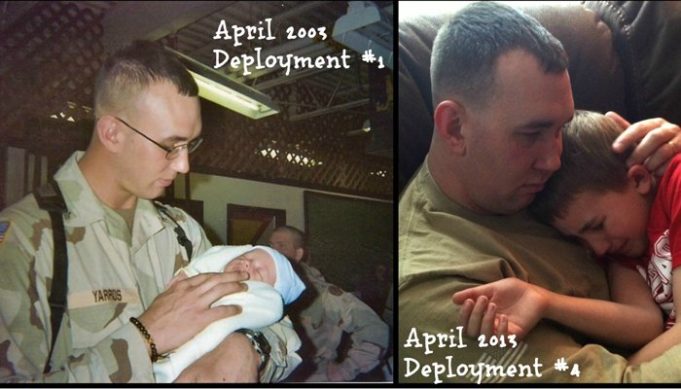There are many difficult emotions and fears when a soldier is at war, and through processing those emotions and being honest it will help the spouse to live more fully during the time when a soldier is away with the military and make it possible to enjoy an unenjoyable experience.
Military Deployments Bring Up Difficult Emotions
Acknowledge worries and concerns stirred because of the deployment, but don’t spend too much time dwelling on those fears. Know that it is okay to be sad or upset. Going through a deployment is a process that can’t be changed though, so once emotions have been processed move on and try to live as full of a life as possible while the service member is overseas.
Dealing with emotions will be a continual process through the deployment, but dealing with them helps in having a more successful separation because of the military.
Tips on Dealing With a Military Deployment
The military decides for families whether a soldier will or will not serve overseas in combat. For many military families these days, dealing with deployment is not a question of if, but when. Because deployments are inevitable, military families need to be armed with tips on how to make the best out of this situation by keeping these strategies in mind:
-Stay busy. Find somewhere to volunteer any extra time, be it a library, an animal shelter, a homeless mission, or a church. Time during deployments can go slowly, so staying busy helps to pass time.
-Find friends to share the experience with. When going through a difficult event like a deployment the only ones who can truly understand the life of a military spouse are other military spouses. A support group is vital during deployments.
-Do something new. Start a gym membership, learn a new hobby, visit local treasures of the town, or get a new job. Accomplishing new things and becoming better as an individual makes the time spent apart during a deployment feel more purposeful.
-Stay connected to the spouse serving overseas. Send e-mails, care packages, and letters as often as possible. Write down lists of things to talk about on the phone while separated, otherwise it is easy to forget them in the excitement of hearing the phone ring. Be honest with the soldier about personal situations, but understand the demands faced in war that are being experienced on the other end of the deployment as well.
Perspective is Important in Surviving a Deployment
Surviving a deployment many times means focusing on the positives rather than the negatives because there can be many good things brought about by a deployment. Sending a loved one to serve overseas does not have to mean it will be an all negative experience. Deployments can be a time to bring new levels to the relationship. Going through something so difficult together, such as a military deployment, can strengthen a marriage and tighten the bond.
Living alone while a military service member is serving overseas can be a time to travel and do new things. Deployment will open up opportunities to become a stronger individual. It will be a time where bonds with other military spouses are strengthened because of a shared experience.
Attitude is very important. Having a positive perspective will help to make deployments a more enjoyable experience. The service member will be able to pick up on positive or negative attitudes over phone calls so it will also help relational bonds during the separation. See the experience of dealing with a deployment not as something that can bring about only negative situations but as something that can bring good.
It is Possible to Survive a Deployment
Deployments aren’t necessarily an enjoyable experience. Sending a soldier overseas to serve with a military unit in war is difficult. However, by staying busy, finding a good support system, and staying connected to the spouse who is deployed, it will help to make the time apart more bearable. Keep a positive attitude and remember that it has the potential to strengthen the relationship. Military spouses are strong, and it is possible to survive a deployment.



















